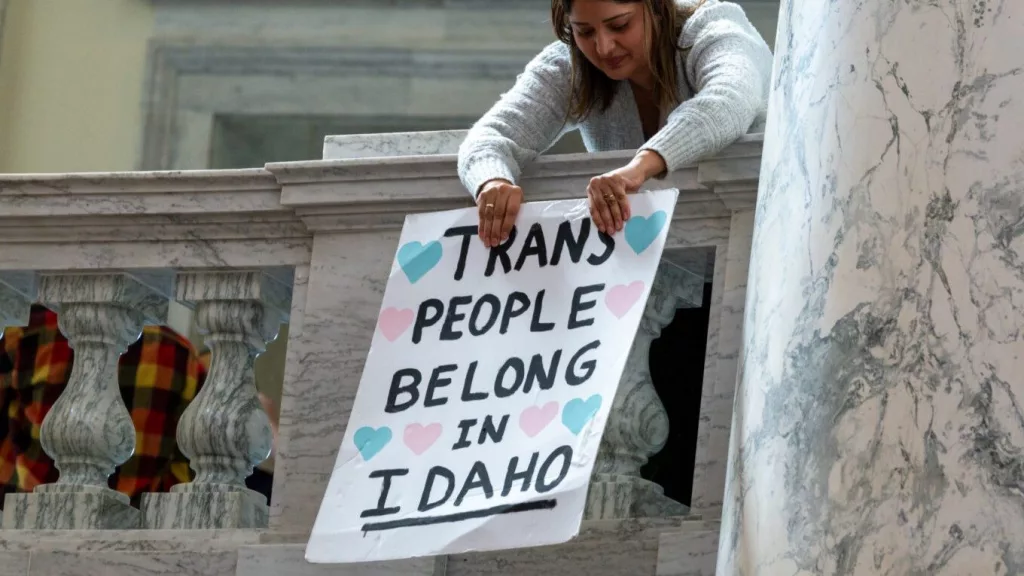(Boise, ID) A federal judge denied a request by suing transgender Idahoans to block a new state law that bans public funds from covering gender-affirming health care.
The new law took effect in July, banning Idaho Medicaid and public funds from covering gender-affirming medication and surgeries.
Transgender and nonbinary Idahoans on Medicaid who sued in 2022 — alleging Idaho Medicaid has an unwritten policy of denying or delaying gender-affirming care coverage — this year amended their lawsuit to seek to block the new law.
Federal judge Raymond E. Patricco, chief magistrate judge in the District of Idaho, in July temporarily blocked the new law from applying to the seven suing patients in the lawsuit through a temporary restraining order that expired.
Legal counsel for the suing patients argued the law should be blocked longer, requesting a preliminary injunction.
They claimed the law violates the U.S. Constitution’s Equal Protection Clause by banning public fund coverage for medical treatments — like puberty blocker and hormone medication — for transgender people, while people whose gender aligns with their sex assigned at birth can still receive that same treatment covered by public funds.
But Judge Patricco denied the request for a preliminary injunction in a Dec. 31 ruling.
Judge, citing suing patients’ legal moves, says extreme injury not clear from law
In his decision, the judge pointed to the suing patients’ legal counsel’s position to not pursue an injunction later in July as a key reason for rejecting the injunction.
The Idaho Department of Health and Welfare, which runs Medicaid, announced in July that medical providers could taper gender-affirming care treatment to Medicaid patients over 90 days under the new law, the judge noted.
“Plaintiffs — by their own explanation, to gain the litigation advantage of avoiding interlocutory appeal and drawing additional plaintiffs into the lawsuit — voluntarily chose to let the temporary restraining order expire,” Patricco wrote. “In doing so, they explicitly acknowledged that the 90-day tapering protocol would prevent irreparable harm.”
The delay to seek a preliminary injunction — combined with the health agency’s notice of tapered gender care coverage and the plaintiff’s withdrawal of its renewed motion for a temporary restraining order — “cast doubt that Plaintiffs will suffer ‘extreme or very serious damage’ absent injunctive relief,” the judge wrote.
Patricco wrote he denied the preliminary injunction request “because Plaintiffs have not clearly made the threshold showing of extreme or very serious irreparable injury.” But, he wrote, “Had Plaintiffs proceeded with the preliminary injunction hearing in July, the legal landscape would no doubt be different.”
Idaho Legal Aid Services Associate Director Howard Belodoff, an attorney who represents the suing transgender patients, told the Idaho Capital Sun he is proceeding on the merits and will seek a final judgement and injunction. A spokesperson for the Idaho Attorney General’s Office declined to comment, citing pending litigation.
What Idaho’s law banning public fund coverage for gender-affirming care does
According to the law, public funds cannot cover hormone therapy, puberty blockers or surgical procedures for the purpose “to affirm the individual’s perception” of their sex. But the law outlines other coverage of the procedures still legally allowed.
In response to the new law, Health West, the go-to gender-affirming care clinic in eastern Idaho, stopped providing gender-affirming care. The move appeared to be driven by fears of losing funding, the Idaho Capital Sun reported.
Less than 1% of Idaho’s population is transgender — or about 7,000 Idaho adults and 1,000 Idahoans age 13 and up, according to estimates from the University of California-Los Angeles.
Around 350,000 Idahoans are on Medicaid, which largely covers low-income and disabled people. Gender nonconforming people are at higher risk for being in a lower socio-economic status, a study in February found.
The bill creating the new law — House Bill 668 — was approved by all but one Idaho Republican state legislators this spring before Gov. Brad Little signed it into law.
Bill sponsors argued the bill ensures taxpayer dollars are not inappropriately used. Opponents said major medical groups say gender-affirming care is medically necessary and safe, and warned the law could lead to a lawsuit.
In December, Idaho Attorney General Raúl Labrador asked the U.S. Supreme Court to hear Idaho’s case. The nation’s highest court rarely approves such direct appeals, called writs of certiorari.
This story first appeared on Idaho Capital Sun.





